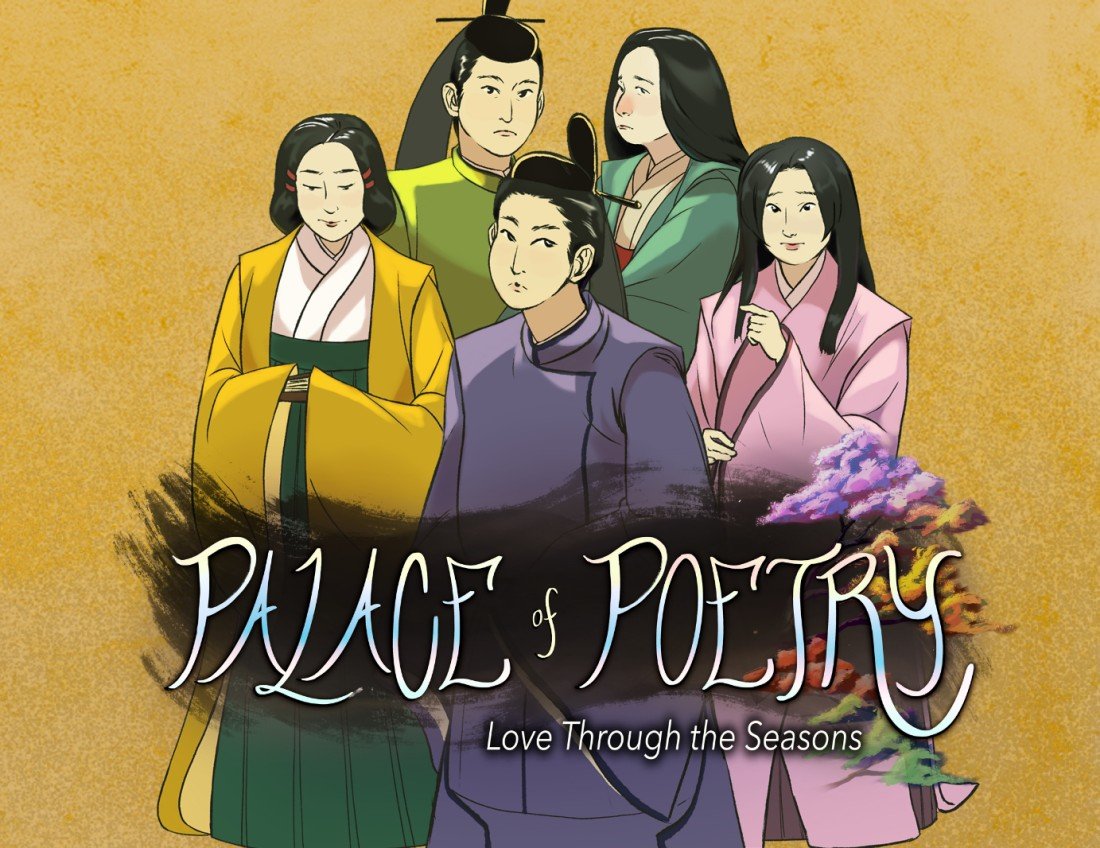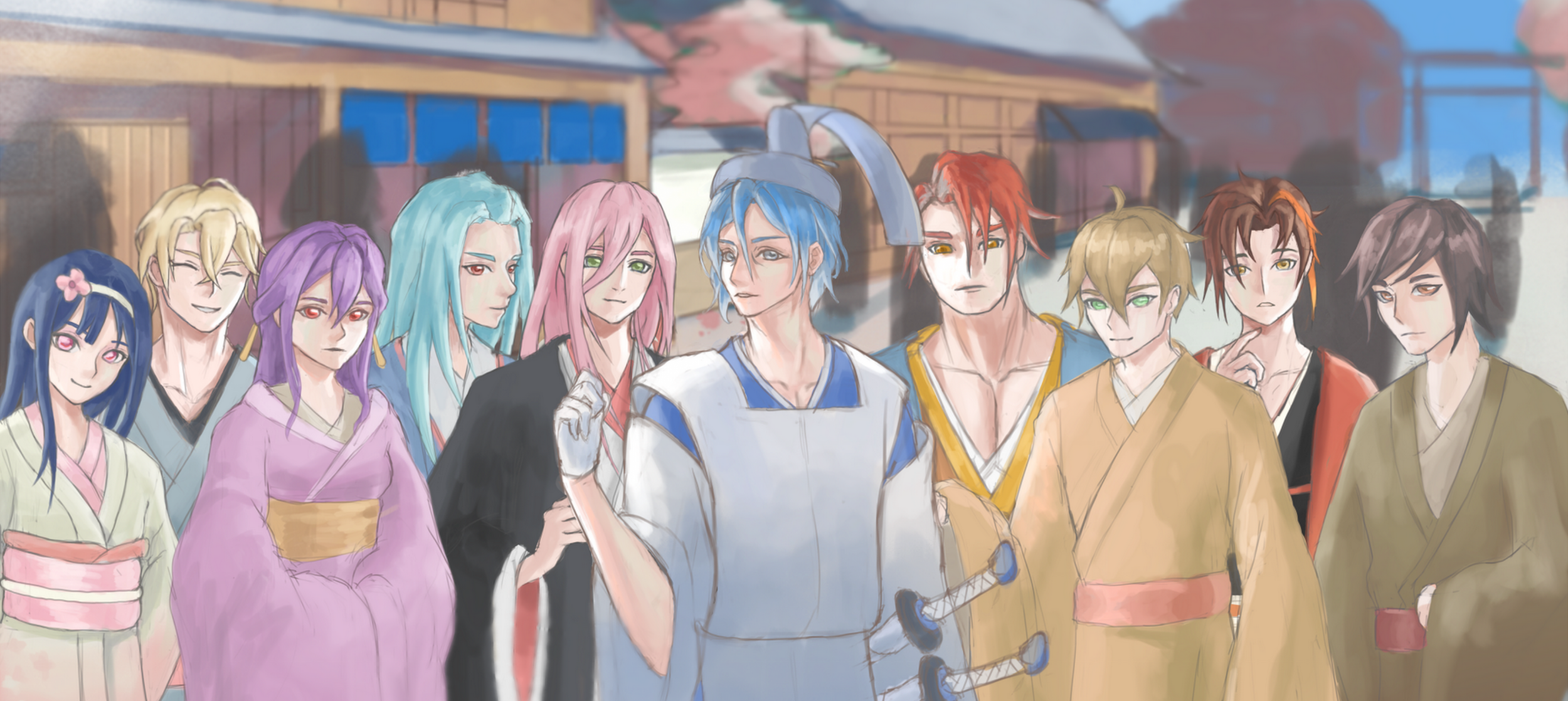JapanLab Projects
At the core of the JapanLab experience are small teams of undergraduates who work alongside a faculty member and a Digital Humanities Developer to design a range of projects. These projects are listed below. You will find fully functional video games like Ghosts over the Water, digital games like Ready, Set, Yokohama, online exhibits like Mapping Violence and Virtual cities like Crafting Yokohama. All projects are listed below including some that are still in development. For games that are ready to use now please see the Teachers page.
-

Palace of Poetry
The Tale of Genji is a sweeping narrative of love, desire, grief, and ambition set a thousand years ago. Centered on the radiant Prince Genji—a charismatic playboy and skilled politician—the story weaves together a rich tapestry of characters, from elegant retired empresses to astute serving women. In Palace of Poetry, a first-person narrative experience, players engage with the women of Genji’s world, immersing themselves in the culture, history, gender dynamics, and daily life of Heian-era Japan.
-

Ghosts over the Water
Ghosts over the Water: Changing the Tides of Japan's Future is an immersive strategy game built upon a familiar and accessible visual novel framework. The game incorporates over 130,000 words of meticulously researched text and lasts for around 10 hours.
-

Ready, Set, Yokohama
Traveling from Tokyo to Yokohama Sugoroku Style. Literally translated as “double six,” a sugoroku is a die-based race game that at its most basic level resembles the game Snakes and Ladders. Acting as the players’ travel guide throughout Yokohama treaty port, this sugoroku provides a window into the 19th century boomtown and cosmopolitan space of globalized trade in Japan.
-

Joshu
Japanese Online Self-Help Utility (JOSHU) is a set of innovative language tools developed by Dr Naoko Suito, who taught Japanese courses at the University of Texas at Austin for many years. JOSHU includes a range of tools for Japanese language instructors and for anyone interested in learning Japanese. In Japanese, JOSHU literally means "assistant", or "tutor", which is what this website attempts to do for anyone interested in learning the Japanese language.
-

The Censor's Desk
To censor or not to censor, that is the question — and the game. When faced with morally or politically sensitive materials that come across your desk, what do you do? This games explores the experience of censorship across multiple periods in Japanese history.
-

Sumoroku
Welcome to Sumoroku–the sumo-themed sugoroku! Sugoroku is a type of Japanese board game with a very simple premise: reach the end. While playing sugoroku may be a breeze, life as a rikishi fighting his way to the top is anything but. In this game, you will follow our rikishi’s arduous journey from humble beginnings to the very pinnacle of professional sumo.
-

Ako: A Tale of Loyalty
Ako: A Tale of Loyalty places the player in Japan in 1701 in the role of a young samurai born into a low-ranking family that is struggling to survive. It is built around a famous episode in Japanese history known as Chushingura, the 47 ronin or the Akō incident.
-

Mapping Violence in Medieval Japan
How do we make sense of a violent, fragmented period? Many histories treat the Warring States era of Japanese history as a formless and chaotic swirl of violence, almost a natural disaster, that swept away older structures in medieval Japan to make way for a new early modernity. Others make it the stage upon which the heroes of countless novels, dramas, or video games battled their way to power. Conflict has a logic to it that we can map and understand.
-

Crafting Yokohama
In the 1880s, Yokohama was one of the fastest-growing cities in Japan, a showcase of Meiji modernization and gateway to an international market. Much of the infrastructure of the treaty port period has since been lost to earthquakes and postwar urban development. In this project, we used cutting-edge techniques in virtual heritage to recapture the environment of two areas of old Yokohama, Noge Hill and Bentendо̄ri.
-

Digital Museum of Japanese Sports
How would you like to write your name in the annals of history alongside some of the world’s most outstanding athletes? Come join the select few who will pioneer the creation of The Virtual Museum of Japanese Sports—the only museum of its kind in the world! The wings of the museum will be filled with detailed descriptions of many Japanese sports, both native and imported, and their greatest practitioners through time. You will create the initial framework upon which this project will continually expand.
-

Land of the Rising Star
This game charts a Japanese actor’s uncertain journey to transnational stardom. Several Japanese stars have historically paved the way: Hayakawa Sessue broke into the U.S. and European markets amidst rising Japanese national pride in the 1920s; Yamaguchi Yoshiko emerged as a symbol of ethnic harmony within Asian colonies under Japanese empire during WWII; and Takakura Ken epitomized the zenith of Sino-Japanese diplomatic relations in the 1980s. In the game, the player takes on the role of an aspiring Japanese star who must navigate the path to international fame. Which roles will you accept? Which will you decline? And at what cost or benefit? How to navigate the many pressures from your talent agent, your fans, the media, and sometimes also the censorious authorities?
-

Negotiating the Kenmu Transformation
Civil war divided Japan for most of the fourteenth century, a conflict that ultimately resulted in the rise of regional lords, led by shoguns who controlled less territory but held it in a far more autocratic grip. Yet at the start of the century, ambitious people dreamed of very different outcomes. In Kyoto, a branch of the imperial family sought to wrench power back from those ruled in their name, and nobles planned to rule as their ministers. In Kamakura, a family of warrior-administrators attempted to consolidate their power to summon warriors to law courts and to battle. North of them, a well-connected warrior lord thought he was the culmination of his grandfather’s prayer that his family should seize the realm.
-

Playing at Empire: Imperial Japan through Sugoroku
Between 1873-1945, Japan built a massive Pacific Empire. Its first colonies, Taiwan and Korea, were internationally recognized, like British control in India and French in Vietnam. Later conquests, such as the puppet regimes in Manchuria and mainland China, were rejected by the US and UK, leading to WWII in the Pacific. How did the Japanese people understand this empire, its growth, and its collapse? This project will explore public attitudes through a neglected source: board games. The Japanese empire was a popular theme for sugoroku, a game similar to “Snakes and Ladders.”
-

Isle of Traitors
This game explores the Amboina incident, a famous and controversial conspiracy case that took place 400 years ago but which remains unsolved today. For centuries now scholars have dissected the Amboina case. It’s been the subject of countless pamphlets, books and other publications. This game places you at the center of a historical mystery. Why have twenty Japanese mercenaries and English merchants been executed? Was there a real conspiracy? Or was the whole thing made up?
-

The Warrior's Heir
Succession struggles are dramatic gold, from classic theater to modern TV. But they're also enlightening, revealing our assumptions about what makes a family--what makes a marriage, or a parent? What can be inherited or earned by personal effort? How much say do the beloved dead get after they are gone, and how do we the living prove what they wanted? The team will decide, together, how best to take centuries-old legal documents and bring to life the world they depict with a visual novel, courtroom drama, puzzle solver, or another interactive story. Our goal is to help teachers of world history put medieval Japan onto their syllabi and guide interested players through the complexities of premodern Japan's legal principles to our shared humanity.
-

I Thought You Died in a House Fire
Inspired by the traditional Japanese board game, Sugoroku, this visual novel follows Yū, a young woman returning to Kamakura from the US in 1926 after the sudden death of her parents. As she explores her childhood home, Yū discovers burned Sugoroku board pieces, each revealing a memory of her mother Seiko’s past. Through piecing together these remnants, Yū uncovers hidden truths about Seiko’s life as a wife and mother during the Meiji era, and the mysterious fire that claimed her family.
-

The Librarian
The year is 1936. Militarism is on the rise as the government prepares for further expansion into China. Crackdown on political dissent following an attempted coup in February compromises citizens’ individual liberties. Word is in the air of a pact in the works with Nazi Germany. You are the new librarian in a small rural town in Japan in charge of vetting books to ensure they comply with the changing times while serving your demanding patrons and bosses. Do not disappoint your fellow countrymen.

